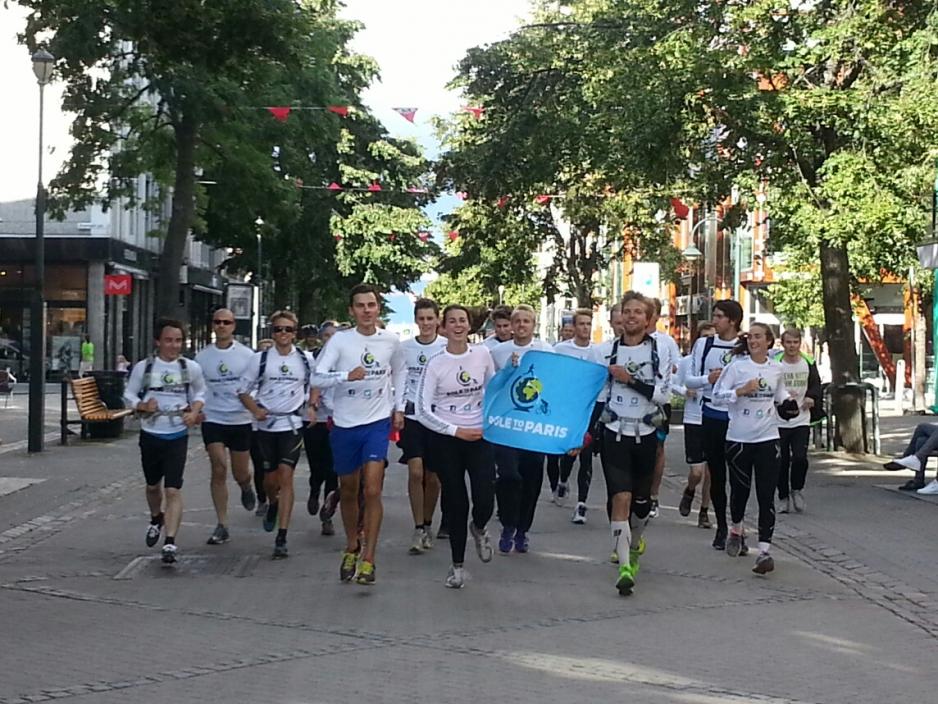The Race Against Climate Change

"Most people aren’t climate denialists or alarmist; they are somewhere in the middle. They have heard about climate change and have questions, so being accessible out there as a climate researcher is great in answering questions", explains Erlend Knudsen, Deputy Director of the climate awareness campaign Pole to Paris and post-doc at the University of Cologne.
Erlend Knudsen challenges other scientists to make themselves available for two-way interaction too.
The frustration over the lack of climate action despite the science available initially motivated a team of young researchers to start the project ‘Pole to Paris’. Whereas 97% of climate researchers agree on human-induced climate changes, 45% of the U.S. general public believes that climate change is either natural or non-existent.
Referring to science communication, Knudsen recently presented the initiative at the Arctic Science Summit Week (ASSW) in Prague, the Czech Republic, and raised the question how scientists can best connect with a wider audience.
Running from Tromsø to Paris for the COP21 Climate Change Conference in 2015, he tried to reach as many communities on the way as possible, answering their questions about climate change, but also listening to the stories from the ones facing climate change first-hand. The wide target group included everything from kindergartens, schools, universities, open events, and social and conventional media, among others CNN.
Easier to reach people in running clothes
Running clothes help the cause. Knudsen clarifies: "I want to be on same level, using a language people can understand. During Pole to Paris, I was dressed as a runner, and this made it easier to reach people compared to sitting in my office or traveling around by airplane."
Changing people’s hearts and minds about the state of the planet is not going to happen out of a PowerPoint presentation, but by changing the story. What you believe in also depends on which group you belong to. It’s a "tribal story".
Stories from people who are experiencing the repercussions of climate change can help expand people’s narrative so they can see themselves as part of a larger group. Other belief systems, including on issues such as climate change, then become less threatening to them and their identity. At the ASSW, Elaina Ford of ICE-ARC confirms the importance of personal stories and underlines the idea of using them as a hook and adapting them to the audience.
The human dimension of climate change
Personal stories also shed light on the human dimension of climate change. Mike Moloney of the Arctic Institute of North America suggests not communicating science directly, not putting it on the forefront, but rather making it the trigger and connecting it to the audience’s humanity to get an empathic response.
Knudsen, while being used to large datasets and numbers in his daily life as researcher, was moved by the stories he heard. One of them was from Laila Inga, a Sámi living of traditional reindeer herding.
Due to climate change, the temperature has risen in the once stable and cold winter, causing so-called rain-on-snow events, which create ice layers on the lichen and make it very hard for the reindeer to dig through. Unless they are fed, they will starve. For Inga, this means a threat to her livelihood. She fears that her children will not be able to carry on with the Sámi traditions.
Scientists, speak up!
The COP21 was a big step forward, but still nowhere close to where we should be at this point in time. "The Paris Agreement contains beautiful signatures on paper, but until we have significant climate action, it remains just that: signatures on a piece of paper", says Knudsen.
It’s a great starting point, for better or for worse, that climate change is on the agenda and covered so much in the news. Climate researchers should use this potential and the opportunities that come up in daily life to talk about the issue as much as possible. Knudsen challenges the audience of scientists at the ASSW: "We live in a post-factual society or moving towards it. We – the scientists – have a responsibility to counteract this trend. Engage with people around you, speak up!" #makefactsgreatagain"
